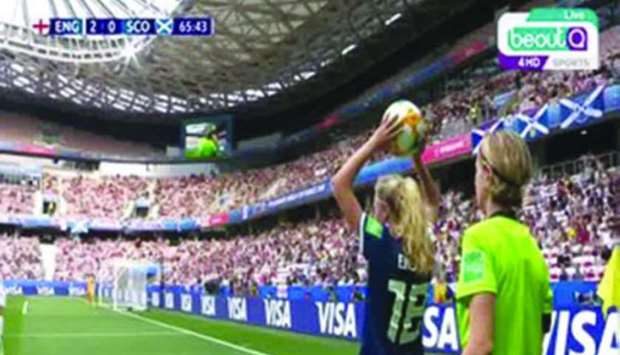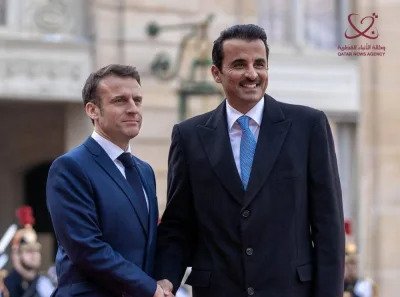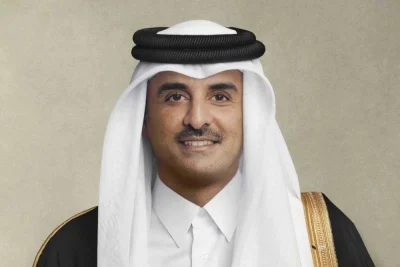The Premier League received a boost after a court ruled that a Saudi Arabian satellite provider has pirate-broadcast every game so far of the Women’s World Cup to Europe.
A hearing in France found that Riyadh-based Arabsat was illegally transmitting the tournament on the rogue channel, beoutQ.
The Premier League, the Bundesliga, LaLiga and FIFA have all begun joint legal proceedings against beoutQ in Saudi Arabia over piracy, which could damage how much rightsholders pay them in future.
The court actions have so far got nowhere, but it’s hoped the ruling by the Tribunal de Grande Instance in Paris will pile pressure on the Saudis to stop the theft.
BeoutQ is able to steal content from a Qatari channel, which owns the rights to the Women’s World Cup across the Middle East, and broadcast it to Europe.
Doha-based beIN Sports has said it may re-evaluate how much it pays organisations like the Premier League for exclusive rights to its programme if games can be seen widely for free.
Yousef al-Obaidly, CEO of beIN Media Group, said: "The latest legal ruling in France shows that even if we are illegally denied access to justice in Saudi Arabia, we will use every means possible to hold beoutQ and Arabsat to account for their daily theft of rights holders’ intellectual property.
"But we are not fighting this battle alone – the weight of the international community is now coming to bear firmly on Saudi Arabia to end its safe haven for piracy, which is destroying not only the economic model of the global sports and entertainment industry, but also the livelihoods of content creators all around the world."
Besides the Women’s World Cup in France, beoutQ has also pirated the men’s tournament in Russia last year, the UEFA Champions League, two seasons of the Premier League, La Liga and Formula One.
Earlier this week, the Italian league, Serie A, announced it had taken legal action against beoutQ over piracy, a move which has thrown into doubt the Saudi hosting of the next Supercoppa in Jeddah.
The French ruling follows two years of denials by Arabsat that it was behind the piracy, despite evidence from digital security and technology companies that this was the case.
Arabsat even switched to frequencies that were not available in France so as to evade detection by the court.
As well as sport, beoutQ has also been accused of stealing tens of thousands of TV programmes, films and music videos.
It led to John Whittingdale, former chair of the UK's Culture, Media and Sport Committee, telling the House of Commons this week: "Online piracy of video and music content is still doing considerable damage to our creative industries, particularly by beoutQ, which is based in Saudi Arabia and is stealing content form a wide range of UK rights holders’.
A hearing in France found that Riyadh-based Arabsat was illegally transmitting the tournament on the rogue channel, beoutQ.
The Premier League, the Bundesliga, LaLiga and FIFA have all begun joint legal proceedings against beoutQ in Saudi Arabia over piracy, which could damage how much rightsholders pay them in future.
The court actions have so far got nowhere, but it’s hoped the ruling by the Tribunal de Grande Instance in Paris will pile pressure on the Saudis to stop the theft.
BeoutQ is able to steal content from a Qatari channel, which owns the rights to the Women’s World Cup across the Middle East, and broadcast it to Europe.
Doha-based beIN Sports has said it may re-evaluate how much it pays organisations like the Premier League for exclusive rights to its programme if games can be seen widely for free.
Yousef al-Obaidly, CEO of beIN Media Group, said: "The latest legal ruling in France shows that even if we are illegally denied access to justice in Saudi Arabia, we will use every means possible to hold beoutQ and Arabsat to account for their daily theft of rights holders’ intellectual property.
"But we are not fighting this battle alone – the weight of the international community is now coming to bear firmly on Saudi Arabia to end its safe haven for piracy, which is destroying not only the economic model of the global sports and entertainment industry, but also the livelihoods of content creators all around the world."
Besides the Women’s World Cup in France, beoutQ has also pirated the men’s tournament in Russia last year, the UEFA Champions League, two seasons of the Premier League, La Liga and Formula One.
Earlier this week, the Italian league, Serie A, announced it had taken legal action against beoutQ over piracy, a move which has thrown into doubt the Saudi hosting of the next Supercoppa in Jeddah.
The French ruling follows two years of denials by Arabsat that it was behind the piracy, despite evidence from digital security and technology companies that this was the case.
Arabsat even switched to frequencies that were not available in France so as to evade detection by the court.
As well as sport, beoutQ has also been accused of stealing tens of thousands of TV programmes, films and music videos.
It led to John Whittingdale, former chair of the UK's Culture, Media and Sport Committee, telling the House of Commons this week: "Online piracy of video and music content is still doing considerable damage to our creative industries, particularly by beoutQ, which is based in Saudi Arabia and is stealing content form a wide range of UK rights holders’.



